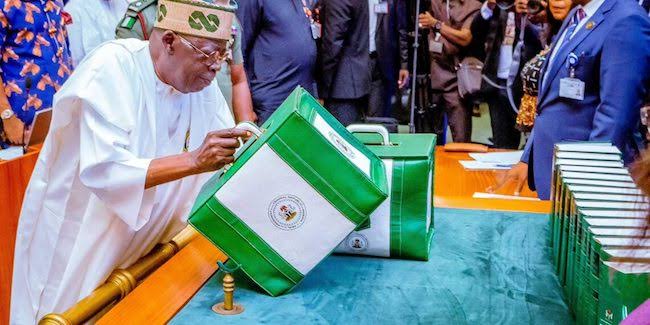Experts in social and economic sectors have advocated proactive financial regulatory measures to ensure probity and accountability in the implementation of the 2025 budget.
The experts, including economics, academics, public administrators and entrepreneurs, spoke in Bauchi, Dutse and Gombe while reacting to the 2025 budget presentation to the National Assembly by President Bola Tinubu.
They said the measure was imperative to stimulate successful implementation of development programmes outlined in the proposed estimate.
Tinubu on Wednesday presented a proposed N47.96 trillion government expenditure for 2025 fiscal year.
READ ALSO:
2027: APC vows to reclaim Oyo, Osun for Tinubu
Ibadan carnival tragedy: Govt. confirms loss of several children’s lives
Press Statement
Highlights of the budget allocations included N4.91 trillion for defence and security; infrastructure N4.06 trillion, health N2.48 trillion and education N3.52 trillion
The budget seeks to restore macroeconomic stability; enhance the business environment, foster inclusive growth, employment and poverty reduction as well as promote equitable income distribution and human capital development.
Mr Abubakar Garba, a Bauchi-based entrepreneur, said the proposed estimate marked a significant milestone in Tinubu’s effort to drive economic growth and development in Nigeria.
He said the budget was a clear indication of the president’s commitment towards revamping Nigeria’s economy.
Dr Adamu Hassan, a lecturer at the Federal Polytechnic Bauchi, said the budget would make a positive impact on Nigerians.
“The proposed budget allocation to key sectors such as education, healthcare and infrastructure development will go a long way in addressing the developmental challenges facing our country,” he said.
He said the government also planned to drive inflation down from 34.6 per cent to 15 per cent, and improve the exchange rate from approximately N1,700 to N1,500 per U.S. dollar, and increase crude oil production to 2.06 million barrels per day.
According to Hassan, Tinubu administration’s reforms are beginning to yield positive results, which will boost the social and economic fabric of Nigerian society.
Also, Mr Gad Daniel, Executive Director, Maltex Development Initiative, expressed optimism over the increased budgetary allocation to defence, adding that it would address insecurity in the country.
He said the improved allocation for infrastructure development would create an enabling environment for businesses to thrive.
A farmer, Kabiru Musa, commended Tinubu’s proposed farmer support programme in the coming year, and called for measures to guard against diversion of fertilisers and inputs.
Musa noted that without addressing the issue of inputs not getting to the genuine farmers, efforts of the administration in food security would not be achieved.
Corroborating Musa, a female farmer, Jane Ayuba said strict monitoring mechanisms would prevent middlemen from diverting inputs meant for farmers, especially fertilisers and agrochemicals.
She urged the Federal Government to adopt multi-crop support as against the usual rice, wheat, maize, sorghum among others.
“The issue of funding and input support to farmers is a good policy statement if there will be a political will to push it to fruition.
“Many people have embraced agriculture but insecurity has driven them away from their farmlands.
“If there’ll be support in terms of subsidised farm inputs, fertiliser, that’ll be a great boost to agriculture as more people will leverage on the advantage to increase productivity,” she said.
Similarly, Williams Attah, a journalist in Gombe, said the government’s focus in tackling insecurity would encourage more farmers to return to their farmlands.
He called for proactive measures to address insecurity preventing farmers from carrying out their activities, especially farmer/herder clashes.
However, Ahmad Balarabe, a resident of Dutse, called for effective monitoring and regulatory financial framework to guide implementation of the budget.
This, he said, was necessary to ensure budget tracking and policy implementation to stimulate sustainable social and economic development outlined in the proposed budget.
He said the increased allocation to security and social sectors would enhance access to quality education, healthcare service delivery, to improve the overall wellbeing of the citizens.
Also contributing, Zulkiflu Muhammad and Mrs Zainab Ahmad, urged the government to ensure that all public schools, including tertiary institutions work optimally, considering the huge allocation to the sectors. NAN

